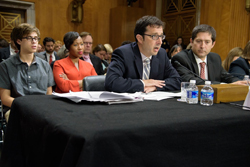
Editor’s Note: This blog post was written by Enough Project Intern Will Cullen.
On Wednesday June 8, Enough Project Policy Director, Brad Brooks-Rubin, testified before the Senate Foreign Relations Committee’s Subcommittee on Africa and Global Health Policy, convening for a session on “U.S. Sanctions Policy in Sub-Saharan Africa.” Other witnesses included the Honorable Sue E. Eckert, Senior Fellow at Brown University’s Watson Institute International and Public Affairs; Dr. Todd Moss, Chief Operating Officer and Senior Fellow at the Center for Global Development; and the Honorable Princeton N. Lyman, Senior Advisor to the President of the United States Institute of Peace. Chairman Jeff Flake (R-AZ) presided over the hearing with Ranking Member Ed Markey (D-MA), and Senator Chris Coons (D-DE) also in attendance.
“Sanctions are about making clear to the Congolese people that we will not help entrench strong men, but will always lend a helping hand to people working to build strong institutions and prosperous societies” – Senator Markey
Although the hearing included discussion of, and recommendations for, sanctions policy in the whole of sub-Saharan Africa, the Democratic Republic of Congo (DRC) was the primary focus. In Senator Markey’s introduction, he remarked that “President Joseph Kabila has been using every tactic at his disposal to manipulate institutions, suppress political opposition, and delay elections to try to remain in power beyond the end of his mandate, a mandate set by DRC’s constitution.” For over a year, large coalition of civil society including leaders, activists, and students have asked Kabila to adhere to the constitutionally-mandated two term limit by stepping down and holding free and fair elections for a new president. In recent weeks, Government security forces have violently used tear gas, beatings, and bullets as a response to country-wide demonstrations.
During the hearing, the panel agreed that targeted sanctions must be paired with a broader foreign policy strategy and achievable goals. Sen. Markey highlighted the effectiveness of sanctions when paired with policy goals, referencing how multilateral sanctions against Iran created leverage to facilitate nuclear talks.
Brooks-Rubin’s testimony addressed how current U.S. sanction policies towards sub-Saharan Africa have been ineffective and how a modernized approach would create more stability in the region. Brooks-Rubin outlined a sanctions policy that could target the root causes of the conflict in the DRC: “As the Panama Papers revelations and the work of our investigative initiative The Sentry show, the networks involved are using many of the same types of transactions that narco-traffickers, terrorist networks, and corrupt regimes in other parts of the world are using, and against which we have deployed the full array of tools of financial pressure. The violent kleptocracies in Africa all come back to money, and as a result, we have the power to use sanctions and other tools to disrupt them.”
Brooks-Rubin specified six key recommendations to the Senate for an effective and modernized sanctions approach in sub-Saharan Africa:
- Identify clear policy goals;
- Develop better financial intelligence;
- Employ modern sanctions tools;
- Build on the actions at key junctures;
- Prioritize enforcement; and
- Keep sanctions temporary and mitigate negative impacts.
Brooks-Rubin highlighted the importance of allocating greater intelligence and investigative resources dedicated to sub-Saharan Africa at the Department of the Treasury and other U.S. agencies and urged Congress to pass the Global Magnitsky Human Rights Accountability Act (S.284). The Global Magnitsky Act, which passed the U.S. Senate in December 2015 and moved out of committee in the House in May, would give the President the ability to impose sanctions on non-U.S. citizens guilty of corruption or gross violations of human rights perpetrated against whistleblowers. Chairman Flake and Ranking Member Markey concluded the meeting, emphasizing the time-sensitive nature of the conflict in the DRC and the ability of the U.S. Senate to take effective action.
- Read Senator Markey’s letter to Secretary Kerry here.
- Learn more about recent protests in the DRC here.
- Watch video of the testimony below. (Brooks-Rubin’s testimony begins just after the 53:17 mark)


